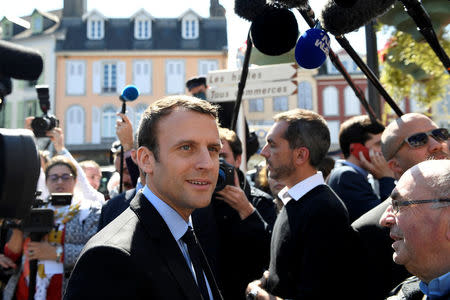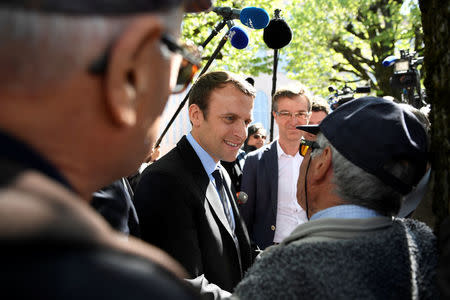France's Macron would seek more EU ministerial say on bank rules
PARIS (Reuters) - French presidential candidate Emmanuel Macron will push to give more power to European finance ministers to set bank capital rules to boost credit flow in the economy, his adviser, French European parliamentarian Sylvie Goulard said on Wednesday. Goulard shed light on comments by Macron made earlier in March when he said he wanted bank and insurance capital rules set by European Union finance ministers rather than by regulators. Such a move could run up against EU decisions to make the European Central Bank the main banking supervisor. France, which is home to four out of 30 global systemically important banks, has been a vigorous critic of new global bank rules being hammered out by the Basel Committee of bank supervisors and opposed a big hike in banks' capital requirement. "In the EU we set in common the basic rules/levels and then allow some flexibility to regulators/supervisors," Goulard said in an email to Reuters. "It is not that strange to have regular assessment to see if the basic rules/levels are appropriate". Macron, a former French economy minister who is frontrunner in the polls to win the election, has said that regulators were too focussed on reducing risk, discouraging banks and insurers from lending to the wider economy. Giving more power to ministers would likely come at the expense of regulatory bodies who, Goulard said could "come to a point where they draft legislation" under the current setup. With regulators requiring banks to hold higher levels of capital to offset their risks in order to avoid a repeat of the 2007-2009 financial crisis, Europe has been struggling to strike the right balance between strong capital requirements and the need to keep credit flowing to broader economy. "A yearly assessment by Ecofin (EU finance ministers) could indeed make the ministers consider more the spill over of national decisions". When European Union lawmakers adopt a set of global financial rules, such as those under discussion with the Basel Committee, the text is then voted in each EU state, usually with some changes to take into account particularities of banking systems. "We need to move away from discussions where abstract, short term national interests prevail to a broader picture of the common interest, ensuring we all benefit from the single market," Goulard added. (Story refiles to read systemically in paragraph 4.) (Reporting by Maya Nikolaeva Editing by Jeremy Gaunt; Editing by Leigh Thomas)

 Yahoo News
Yahoo News 


